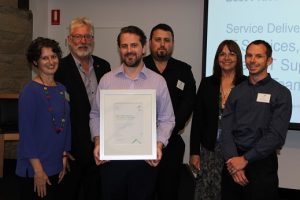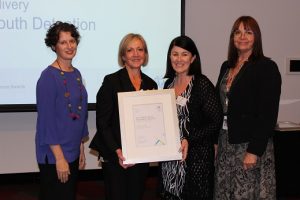IT Services, School and Client IT Support, Department of Education
 The IT Services, School and Client Support, End Device team successfully managed to undertake a re-engineering of the Department of Education end-device environment to support the rollout of the new Windows 10 based IT environment across the department. The move to Windows 10 in schools provided teachers and students with much quicker access to the software tools they need to complete their learning tasks as well as greater flexibility and reliability in their daily use across the school.
The IT Services, School and Client Support, End Device team successfully managed to undertake a re-engineering of the Department of Education end-device environment to support the rollout of the new Windows 10 based IT environment across the department. The move to Windows 10 in schools provided teachers and students with much quicker access to the software tools they need to complete their learning tasks as well as greater flexibility and reliability in their daily use across the school.
The End Device team developed a rollout package of Windows 10 used in Parliament Square and across the corporate areas of Education that upgraded integrated devices and has enabled the team to provide advice to DPAC, Treasury and StateGrowth on how to undertake such upgrades themselves. Equipment was loaned to other agencies so they could become familiar with configuration. A very different approach to training and professional development of teaching staff was taken. Previously this was often simply an emailed PDF to read – this time professional development was around the actual device such as a stylus with tablets, integration with large video screens and use of Apps to run this software from their tablet device, other new software tools that are features of Windows 10 to give educators confidence in using the end devices with the new software upgrade. Feedback from senior educators is that use of this blended technology is being taken up quickly as part of the rollout strategy. In the longer term, upgrades and patching can be undertaken with very little downtime enabling them to easily install and use the most current editions of the various software packages they want.
Ashley Youth Detention Centre, Department of Communities
 The Ashley Youth Detention Centre embarked upon a new way to assist young offenders reintegrate back into the community. Traditionally the focus has been a short-term framework with emphasis on pre-release training following a structured pathway and requiring completion of traditional education subjects before progressing to vocational opportunities. For a variety of complex factors, young offenders have struggled to meet the needs of the traditional subjects which then denies them access to vocational training on release. A reform approach was taken that is aspirational and future focused by having a transitional viewpoint of ongoing support that connects custodial support to community support. This requires the staff to operate outside normal practice to make education and training accessible to young people in custody they may not have been able to access. The submission outlined the story of one young individual in the program and the strong involvement of supportive social groups and an employer in Deloraine with very strong collaboration, development of partnerships not previously undertaken with outside groups and joint management. It is clear that this has been a very challenging approach with many stereotypes needing to be challenged and broken down as well as strong support from all stakeholders to maintain the confidence of the young person to move through the vocational training. Significantly, commitments have been made by the local community involved to continue the support after release. Other young offenders have indicated their preference to become part of the program when they are of suitable age. The changed approach to education and employment assistance for young offenders is worthy of this award as a new way of approaching service delivery in that sector.
The Ashley Youth Detention Centre embarked upon a new way to assist young offenders reintegrate back into the community. Traditionally the focus has been a short-term framework with emphasis on pre-release training following a structured pathway and requiring completion of traditional education subjects before progressing to vocational opportunities. For a variety of complex factors, young offenders have struggled to meet the needs of the traditional subjects which then denies them access to vocational training on release. A reform approach was taken that is aspirational and future focused by having a transitional viewpoint of ongoing support that connects custodial support to community support. This requires the staff to operate outside normal practice to make education and training accessible to young people in custody they may not have been able to access. The submission outlined the story of one young individual in the program and the strong involvement of supportive social groups and an employer in Deloraine with very strong collaboration, development of partnerships not previously undertaken with outside groups and joint management. It is clear that this has been a very challenging approach with many stereotypes needing to be challenged and broken down as well as strong support from all stakeholders to maintain the confidence of the young person to move through the vocational training. Significantly, commitments have been made by the local community involved to continue the support after release. Other young offenders have indicated their preference to become part of the program when they are of suitable age. The changed approach to education and employment assistance for young offenders is worthy of this award as a new way of approaching service delivery in that sector.
